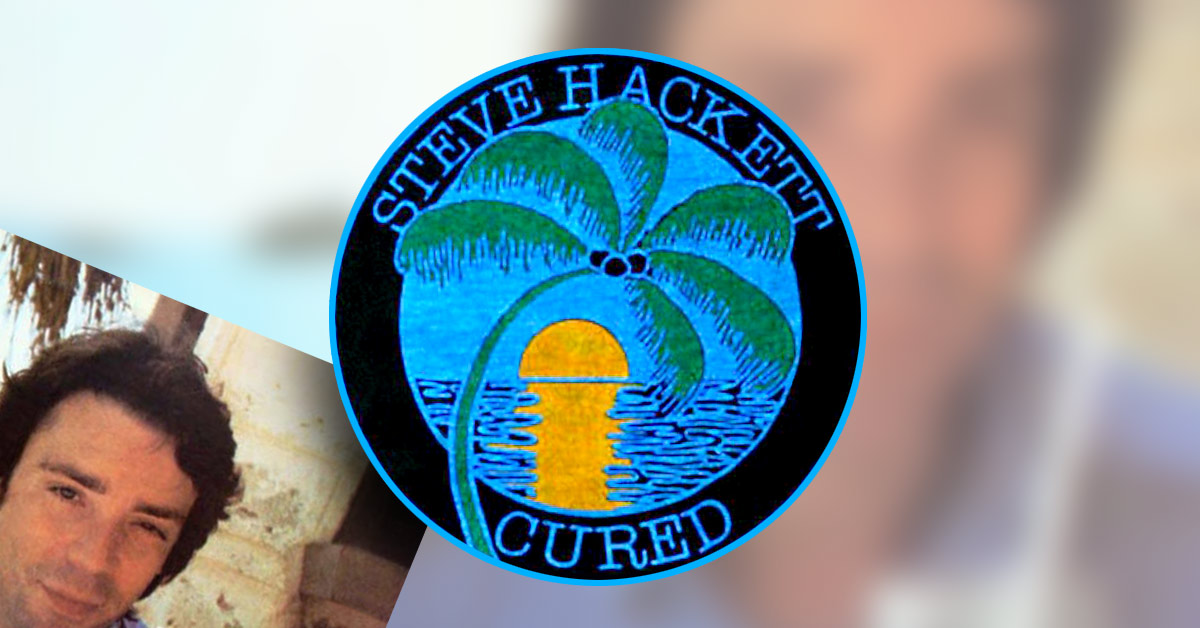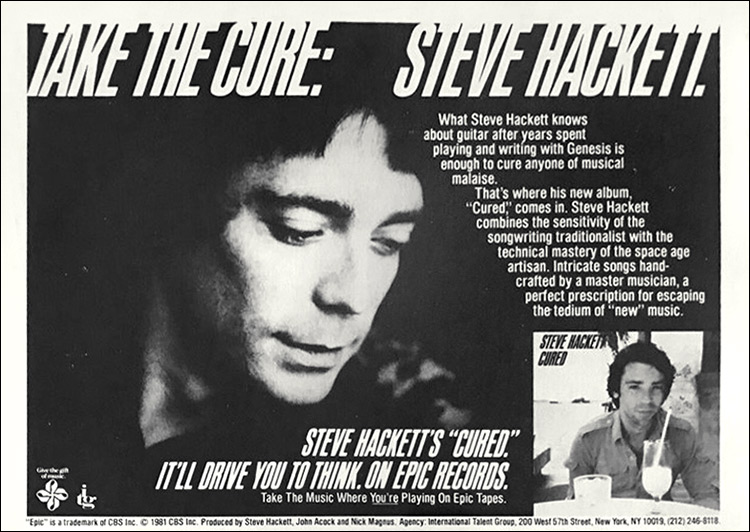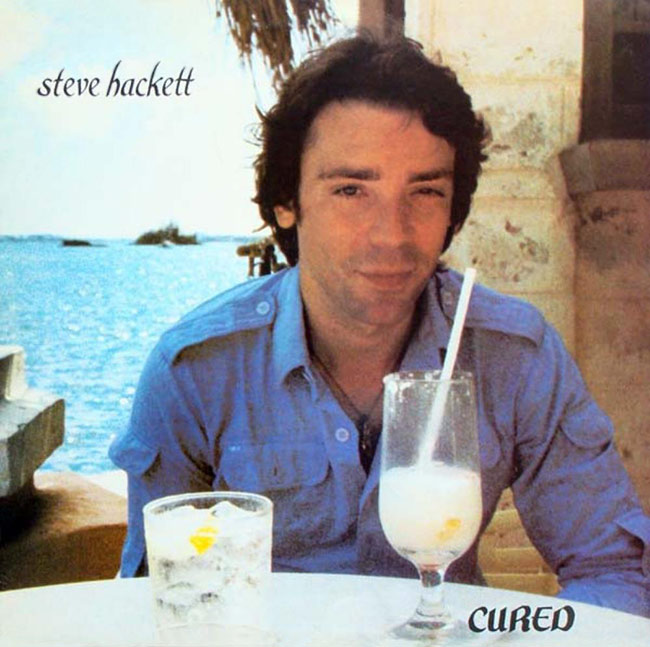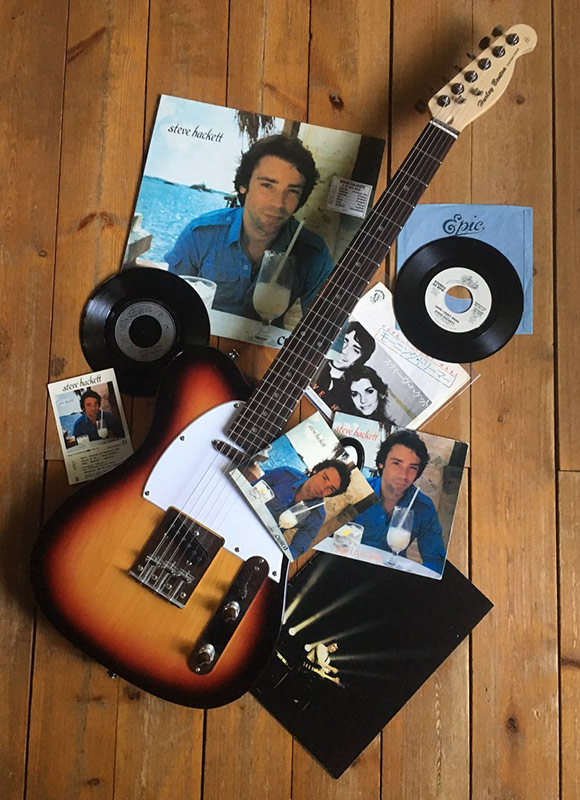- Article
- Read in 9 minutes
Steve Hackett – Cured – album review
After a little break and some changes in his band, Steve returned with his fifth album in 1981: Cured. Thomas Jesse looks back.
Background
1981 would bring many changes for Steve Hackett. Having been on tour a lot since the autumn of 1978 – he played about a hundred shows in Europe and North America – and working hard on his solo career he encountered health issues that meant he had to have a gastric ulcer treated in hospital. He used the period of recovery to go to Brazil for several months and consider his career and a healthier lifestyle. He stopped smoking and drinking alcohol, lost some weight and took up running [1]
He tried to get his record company, Charisma, to release a live album (in fact, live recordings of his would appear only in 1992 on Time Lapseand on the Live Archive 70, 80, 90sbox set in 2001). Charisma insisted on a new studio album because his career was going well and they wanted to feed it with new material [2]
He split up with his band, retaining only Nick Magnus, because of economical reasons but also because he was uncomfortable as part of a band machine again (his band mates wanted to have more say in the songwriting process).
He began to work on a new album with Magnus.
Steve had written most of the songs during his time in Brazil. In early summer they went into Redan studios, London [3] to record. Steve used John Acock as an engineer and also as a producer alongside himself and Nick Magnus. While Nick focused on the drums, Steve played the guitar as well as the bass. On the album, the drummer was replaced by the brand new Linn drum computer [*4] and the SdS5 drum synthesizer. Both instruments were played by Nick, while Steve did the vocals. He had joined in the backing vocals on his previous albums and sang the lead voice in The Hermit, Carry On Up The Vicarage and The Ballad Of The Decomposing Man (featuring The Office Party).
Steve enjoys singing, as he says, and taking singing lessons facilitated his decision to sing. Steve’s brother John played the flutes on Overnight Sleeper and bass pedals on The Air-Conditioned Nightmare, while Bimbo Acock played saxophone on Picture Postcard. The album came out on August 14, 1981, the day Steve Hackett married Kim Poor. It was called Cured and went to #15 in the UK charts. [5]
Hope I Don’t Wake was released as the first single backed with Tales Of The Riverbank (except in Japan and Canada, where it was backed with A Cradle Of Swans, and in Italy, where it was backed with Funny Feeling). The second single was Picture Postcard backed with Theme From Second Chance. Both single flipsides and The Air-Conditioned Nightmare (played live at Reading Festival) make up the bonus tracks for the 2005 remaster.
Cover and artwork
The artwork breaks with the past – no picture by Kim Poor but photos. The front shows Steve Hackett the smiling, relaxed tourist, with a couple of drinks before him and palmtrees and the sea behind him. The rear shows a tropical panorama of a villa overlooking, again, the sea and a beach with palm trees. The photos seem ever so slightly out of focus and exude the holiday feeling on the Bahamas. Kim Poor was not happy with the cover, but Charisma insisted on visualizing the happy mood of the album. When the album came out, Charisma met with criticism from many fans who demanded that Kim Poor’s paintings continue to be used for the cover artwork. [6]
The dust sleeve of the LP contains the lyrics as well as a black-and-white photo of Steve and Kim.
The Songs
Hope I Don’t Wake
The song begins with Steve singing the chorus acapella (what a statement! I can sing unaccompanied, too!) until the drum machine joins in, guitars tinkle, Banksian organ and a lovely, warm bass play a fine tune. It’s all easy listening. The bridge develops into a typical Hackett guitar solo, and then the song ends at 3:47 with a fade-out. A simple, sunny opening song, well suited as a single release but it cannot live up to predecessors like The Steppes.
Picture Postcard
The second single release did not prompt the album artwork, nor does it convey any holiday feeling. Steve sings in a high falsetto about loneliness, about the real experience that cannot be replaced with a picture postcard: “Don’t want a postcard / showing come distant view / just want someone to / lough when I blow a fuse…”
A pop song with surprising effects such as a saxophone solo. From 2:25 onwards there is a touch of Yes (90125), of Jon Anderson’s solo albums and Supertramp, but is this still the Steve Hackett of Voyage Of The Acolyte and Spectral Mornings?
Can’t Let Go
Gloomy beginning, dark keyboards and the bass going „damdadadam“ raise the idea that this might be a track in the style of the previous albums, but no. A brief guitar take turns this song into West coast AOR. Steve sings a very high chorus (which becomes annoying after a couple of times). A great guitar solo along with fine keyboards in the last part create a harmonious ending.
The Air-Conditioned Nightmare
The first instrumental marks the thundering end of side 1 of the LP. It has a guitar soloing like a saw and then dark thunderclouds of keyboards drive the song on. Steve and Nick battle with their instruments, and brother John works the bass pedals. Not a nightmare, but rather a dream for progrock fans. Unfortunately, the tracks shows the limit of the synthetic drums in the sound cascades, which gives the track a touch of predictability, of something worked out in a clinical laboratory. Live recordings will show what a great band sound this track can raise [7]
Funny Feeling
The second side of the LP begins with a sunny, clear song. Fine guitar leads to a disco rhythm that is so typical for the 80s. A song about the end of a relationship… of Steve’s with his former band? Is that too far-fetched a question? The rippling sound is interrupted at 2:25 by a surprising rock guitar moment.
A Cradle Of Swans
The mandatory piece for acoustic guitar. Some echo, romantic sound, virtuoso performance. Another sibling for Horizons, Kims and the like. It begins very quietly, picks up speed and then fades away in something like a flamenco.
Overnight Sleeper
The acoustic guitar from the beginning is soon drowned by keyboard flourishes. A bass threatens rumbling in the background, an Iberian rhythm pumps on until Steve’s vocals come in with a catchy melody played wonderfully by John Hackett on the flute. Steve now sings in a deeper register. The melody again, a guitar solo, and the song is over. The climax of the album that is about a nightmare. The narrator sees himself chased through tunnels by fast trains before he sees the light at the end of the tunnel and awakes. The happy ending of a nightmare-ish period. References to Steve Hackett’s own life are obvious.
Turn Back Time
A gentle, balladesque ending to the album. Would Steve really like to turn back time? With a gentle voice he sings: „When I’m far away from you/ What I’d give to learn to/Turn back time…” A declaration of love as a beautifully calm and melancholy end for an album full of unusually easy to listen to, uptempo, pop songs.
Tales Of The Riverbank
The flipside of the Hope I Don’t Wakesingle adapts a part from a children’s series on TV from the 1950s. Steve found out only much later that the original song was written by Mauro Giuliani as Andante In C [*8]. A lovely track on the acoustic guitar that slightly resembles baroque music, it was re-published as a bonus track on the remastered edition of Bay Of Kings.
Theme from Second Chance
Written for the TV series starring Susannah York and Ralph Bates [*9]. A romantic song played on the acoustic guitar and accompanied splendidly by John Hackett on the flute. This one was re-released as Second Chance on Steve’s album of acoustic music, Bay Of Kings.
All in all
A fresh wind of change blew through the world of Genesis in 1981. Phil Collins started an incredibly successful solo career, Genesis reduced their songs to catchy, straight, even pop/rock songs, almost forgot their past and stunned their fans with the Abacab album.
Steve Hackett dissolved his band, changes his way of life and tried his hand at mainstream music, without turning back time tongue-in-cheek now and then. He produced Cured, an album of short, radio-friendly, in places even pop song that looked to the US market. Only two instrumentals made the cut for the album, but Steve still enjoyed weaving brief, weird guitar solo, quotes from classical music (on acoustic guitar), new technology (Linn drum) and wind instruments such as flute and saxophone into his music.
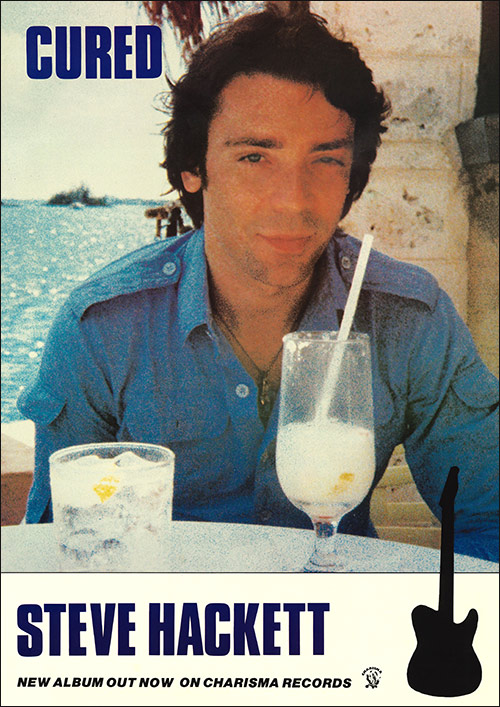
The album is full of a happy (if not Funny) feeling; the shorter songs make it more accessible and easier to listen to than its predecessors. Steve once said in an interview that he wanted to make music for housewives [10]. With Cured he has indeed created music you can listen to during mundane activities.
Steve Hackett showed courage when he decided to sing all songs himself. Unfortunately, he sings in a high pitched voice that sounds forced and soon tires the listener. Unfortunately again, he dropped the choir vocals from his previous albums. Quite remarkable: The influence of Nick Magnus whose keyboards lord it over Steve’s guitar, frequently pushing it backwards to the point of smothering the songs.
There is a certain sterility to the album that is probably caused by the synthetic drums, the modulation of Steve’s voice and the clinical production. Possibly an ingratiation to the popular music of the 1980s.
Genesis lost many old fans with their musical change, but they managed to attract even more new fans and generate commercial success. Steve did not. On the album after Cured, Highly Strung, he tried to stay in the middle ground or courageously go for his goal of making an album with acoustic music (Bay Of Kings) – trying, perhaps, to Turn Back Time? After all, Phil and Mike (and his Mechanics) would write the superior pop songs.
„…It wasn’t a conscious decision to start writing commercial songs. I think one or two of them came out that way because of the use of the drum machine. The album had more lightweight feel. In many ways it was more a duet between Nick Magnus and myself. I was working with the limitations of my own voice rather than with people who had cast iron voices and so I think it was an album finding my way.” [11]
This statement of Steve’s pointed at new developments. He would continue to sing his songs himself, be it live or in the studio, and the new millennium was about to begin before the line-up of his band would become steadier again. Around that time he would find a new partner: Roger King would be as strong in keyboards and production as Nick Magnus. Steve has not produced another album with such a commercial direction; he has continued to write pop songs, though.
We may see Cured as a transitional album, a waypost for Steve on his journey to discover his own niche with his idea of art and the artist in a market that would become ever more commercial, so we can ignore the weak spots of the album and occasionally listen to it while we do the household chores. After all, Cured has a place in Steve’s oeuvre.
Author: Thomas Jesse
English by Martin Klinkhardt
Notes:
[*1] Alan Hewitt, Sketches of Hackett, Wymer, Bedford, 2nd edition 2011, p. 85[*2] Alan Hewitt, Sketches of Hackett, Wymer, Bedford, 2nd edition 2011, p, statement by Brian Gibbons
[*3] This was where he met his later tour drummer Ian Mosley and recorded a track with Box Of Frogs.
[*4] Cf. https://en.wikipedia.org/wiki/LinnDrum and https://en.wikipedia.org/wiki/LinnDrum
[*5] Cf. https://www.chartsurfer.de/artist/steve-hackett/cured-album_fvvfpv.html (site in German)
[*6] Cf the interview mit Kim Poor (pt.2) in it-magazine #14 (March 1995), p.15
[*7] Cf. The bonus track of the CD remaster editions
[*8] Liner notes for the 2005 remaster, Virgin VJCP-68800, Mini-LP-CD; for Mauro Giulani, see https://en.wikipedia.org/wiki/Mauro_Giuliani
[*9] Cf. https://www.imdb.com/title/tt0162108/
[*10] Cf the review in German music magazine Musikexpress #5, May 1978
[*11] Liner notes for the 2005 remaster, Virgin VJCP-68800, Mini-LP-CD

